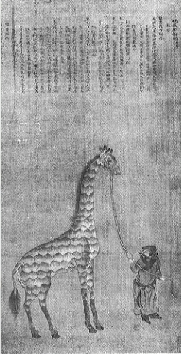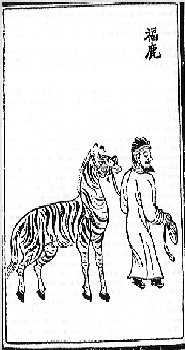
The Ming Dynasty Naval Expeditions documented many startling encounters. This page records the discovery of a creature with a lower literacy rate than the Europeans.



More China?
Yeah, more China. Go read a History of Kuwait that leaves this stuff out if you don't like it.
You'll be back.
The 15th Century Version of SDI
Considering the suffering inflicted on the Chinese by
British and Japanese imperialism, you could hardly blame them for
wanting to expel all the foreigners from their country…
…except for the fact that when the Chinese unexpectedly
enacted their strict isolationist policy, it was hundreds of years
before either the British or the Japanese committed the acts
that would make them unpopular in China.
Even when we employ the clarity of hindsight, no one is certain of the details surrounding the sudden and severe xenophobia that gripped China in the mid-1400s.
I feel like I should explain China's bizarre turn a
little better, but it's waaaaaaay off topic, so I'm going to
give it a Cable News blurb and move on.
Experience suggests
that if I were a conservative web-pundit, I could depart any assertion
without bothering to provide either support or clarity, but alas, I am
bound by an ethical imperative to serve my audience truth when I put
truth on the menu.
(Which I did; it's there under "Chicken
Fried Steak")
At the beginning of the 15th century, China boasted of the world's most advanced culture.
I'm going to do a little hand-waving and give the #2 spot to the Persians, with Islamic East Asia (what would become west India and Pakistan) certainly shaping up as a contender. Far removed from Eurasian awareness, the Aztecs were the most likely culture to grab the #2 slot… but the Chinese were in no immediate danger of being bumped out of first place.
Early on, the Ming Dynasty launched an ambitious campaign of navel exploration — using a fleet twice the size of the Spanish Armada (at its peak!). For reasons that aren't abundantly clear, this program was summarily halted after a few decades.

My theory is that the Chinese had met enough of the rest of the world's population to conclude that we were all filthy sociopaths whose efforts in the arts and sciences could be charitably characterized as torpid — if these efforts were even evident enough to be characterized at all.
I suspect that along with regaining currency in science and technology, the Chinese have probably rediscovered their sense of cultural superiority. Such ethnocentric and geocentric arrogance is silly, but the when the Chinese do it, it seems "retro" — it certainly evokes less irony than the other self-aggrandizing cultures of modernity, particularly my own.
The erudition of 15th Century China exceeded even the accomplished academia of Islamic civilization. Both cultures had made an empirical association between having a large number of smart people and expanding the wealth and power of their civilizations. Islam provided a framework that bridged geography, language and culture — enabling financial and intellectual advancement to flourish from the Swahili city-states of East Africa to the turbulent sultanates in South Asia.
Technology has changed the need for an educated population. These days, state hegemony is advanced with the support of a large number of ignorant people and a small number of smart bombs.
The Chinese united… well… the Chinese united China.
This accomplishment seems rather unremarkable until you learn that 90% of the Chinese population belongs to the same ethnic group, the Han, and then it seems trivial. Of course, if you know anything at all about China and its history, you not only realize it wasn't a trivial achievement, but it's also highly unlikely that you are an American.

The political unification of China doesn't seem trivial when you consider that China is almost as large as the United States, and we're talking about a period in history where it would have taken months to traverse the country. The task seems nearly impossible considering China's language barriers. While everyone in China speaks Chinese, there are over 350 distinct dialects across the country and none of them are mutually intelligible.
To put China in a perspective that many Americans will find easy to grasp, imagine if Christopher Columbus had arrived in the New World, only to find that the United States already existed — except instead of being composed of states named after extinct native tribes, it was composed of actual native tribes. From the Seminoles to the Inuit, this region now called America was an empire uniting hundreds of different cultures and languages.
Now it sounds pretty far fetched, doesn't it?
No? OK, what if I said that they also had cell phones and prepackaged snack foods? Huh? Actually, that would be silly. Forget that.
What saved China from linguistic Balkanization is that all the different dialects — while spoken differently — are generally written the same way. Written communication had already been effected by China's high literacy rate — higher than that of any other civilization at the time, or Alabama at any time.
The sustained success of Chinese literacy was — and is — quite impressive in light of the fact that learning to read and write in Chinese requires spending one's entire childhood memorizing thousands of unique and specific pictograms. In contrast, the Europeans had a writing system that involved only about two dozen glyphs, and yet the only people in Europe who could read and write were a handful of Irish monks — which proves that a sober Irishman can learn to read.
One reader urged me to point out that drunken Irishmen have produced a literary canon that rivals, and possibly exceeds that contributed by American authors. This leads to the rather damning possiblity that even drunken Irishmen are more literate than Americans.
Be that as it may, the observable evidence would have forced the Chinese explorers to conclude that the medieval Europeans had not yet invented writing — or basic hygiene.
The word gwailo
(gwīʹ–lō) is an approximation of the way
the Chinese word for foreigner is pronounced in the Cantonese
dialect. This information is important, and if you don't know why,
do not attempt to impress any Chinese speakers with your
knowledge.
(Note: except for comic effect.)
To this day, one of the most insulting things you can call someone in Chinese is gwailo — a word that simply means foreigner (in some contexts, obviously, this word is less insulting than in others). Another grave insult is to call someone red-hair, which implies they are the shameful offspring produced by a foreigner and some Asian debauched enough to have sex with a foreigner.
Robert Frost, Mending Wall, 1914
Darwin summarized evolution as "survival of the fittest." I look at my species and can't possibly imagine what we're fittest for — unless games shows once occurred in nature.
What Doesn't Love a Wall?
Knock. Knock.
Who's there?
The British Army.
That's stupid.
And unrealistic. The British Army would never bother knocking.
When the foreigners showed up in China — uninvited — four hundred years later, they were equally as dishonorable, vicious, ignorant and uncivilized as they'd been before. However, the blue-eyed monsters had come quite a ways in the arts and sciences.
They were certainly unimpeded by China's as yet unmatched wall technology.
Without going into the gory details — and they are gory details — the Chinese learned Lesson #1 the hardest possible way.
README.earth, 4x10⁹BCE
Uncle Sam's Most Favored Nephews
Even though American authoritarians enjoy running other people's lives — or trying to, at least — they take issue with the Chinese government for committing the same offense.
American authoritarians seem to feel that they can do this without any hint of irony, because they only run the lives of unimportant wage-slaves while the Red Chinese run the lives of all of their citizens. Ironically, all of China's citizens are unimportant wage-slaves.
I guess I shouldn't say "all" citizens, but rather "most" citizens. For some, the government doesn't so much "run" their lives, as "abruptly end" or "impose unconscionable pain and misery onto." Since the historic visit by that American political treasure, Richard M. Nixon, we've had the understanding that when American politicians "take issue with" the Chinese government it really means "fret theatrically about."
The most glaring example of Sino-sycophancy is our attitude toward Taiwan. Taiwan — officially, The Republic of China — is an island country that sits across the Taiwan Strait from the People's Republic of China. Who do we recognize as the legitimate government of Taiwan? The Communist Chinese, a government that took power in 1949 and has never in its history exerted any control over the affairs of Taiwan. Does that make any practical sense? Yes and no.
It doesn't make practical sense if you consider what constitutes a recognizable country in any legitimate context. It does make practical sense, if you decide it makes sense to kiss the collective ass of the communist overlords in Beijing, even when they're being silly. While the US Congress, with the support of the people it represents, has repeatedly affirmed Taiwan's sovereignty, the Whitehouse has caved over and over. Even "stand-tall" anti-communist Ronald Reagan promised China, in 1982, that we would not sell enough arms to Taiwan for it to defend itself against China.
The totalitarian communist government in Moscow didn't get this sweet deal. What did they do wrong?
The Soviet Union put all its effort into being something the USA didn't want around — a rival for global domination. The Chinese have worked to be more of an obstacle than a rival. For example, Chinese efforts to spread communism in Asia differed from Soviet expansionism.
The Soviets were given control of Eastern Europe after World War II, as part of a deal that the Eastern Europeans didn't really get a say in. The Chinese influence in Korea, Vietnam, and Cambodia was requested by one of the factions in each of those countries.
What I've just said oversimplifies a lot of issues and events, but one thing is clear: whatever negatives China had as a cold war foe were made up by its being something the USA can't live without — a market.
The Chinese were communists, but the Soviets were Marxists, and Marxism rejects the concept of being economically viable. The Chinese — having flunked Lesson #1 so spectacularly, didn't botch the trade issue. They trade with the Imperialists, but on their own terms.
This post-mortem of China's 15th Century screwup will be referenced later in regards to events in the Arab world. And, as promised, that's where we're going.
But to be Historically Correct, I'll claim we're going to India.
We're going to India!
Unless we find oil on the way.
|
SMALL PRINT
COPYRIGHT © 2003 Winston Smith Click this link for © details |

Contact: Winston Smith |